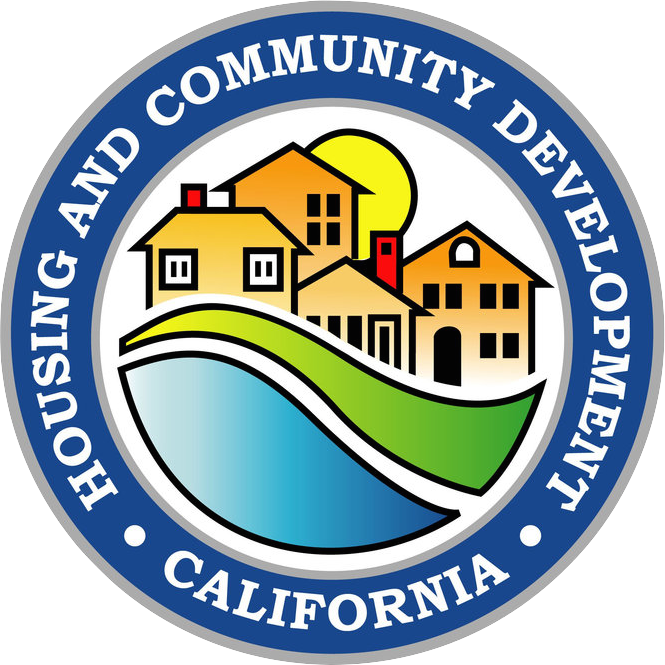Provide Equal Housing Opportunities
Promote housing opportunities for all persons regardless of race, religion, sex, marital status, ancestry, national origin, color, familial status, or disability (Government Code Section 65583(c)(5)).
Required Components of Programs

Effective programs reflect the results of the local housing need analyses, identification of available resources (including land and financing), and the mitigation of identified governmental and nongovernmental constraints. Programs consist of specific action steps the locality will take to implement its policies and achieve goals and objectives. Programs must include a specific timeframe for implementation, identify the agencies or officials responsible for implementation, and describe the jurisdiction’s specific role in implementation.
Fair housing laws make it illegal to discriminate against any person because of race, color, religion, sex, disability, familial status, national origin, ancestry, marital status, sexual orientation, source of income, and age in the rental or sale, financing, advertising, appraisal of housing, provision of real estate brokerage services, etc. (including land-use practices). Government code also expressly prohibits localities from discriminating against residential development or emergency shelters if the intended occupants are low-income or if the development is subsidized. All units of government are required to comply with the Americans with Disabilities Act, which prohibits discrimination against people with disabilities in employment, public and commercial facilities, delivery of services, zoning, and land-use.
Because state and federal laws uniformly outlaw most kinds of housing discrimination, the local government’s role is to identify program strategies that support and implement these laws. Such strategies may include consultation with fair housing and counseling organizations in the community to document the incidence of housing discrimination and evaluation of the availability of services.
In the housing element, a local equal housing opportunity program must provide a means for the resolution of local housing discrimination complaints and should include a program to disseminate fair housing information (including fair housing laws) and resource information throughout the community. The local program must also provide referrals to appropriate investigative or enforcement agencies. Where appropriate, communities should distribute fair housing information in languages other than English. Fair housing information could be displayed on buses/at bus stops, at community and senior centers, local social service offices, and other public locations, such as civic centers or county administrative offices.
The housing element must also address any zoning or other land-use laws or practices that either expressly discriminate against a group protected by the fair housing laws or have the effect of discriminating against a group.
In larger and/or urban jurisdictions, more direct program actions would be appropriate, such as committing to use Community Development Block Grant funds to support fair housing information and referral and counseling services. The locality may wish to contract with (or create) a fair housing council to investigate and resolve discrimination complaints and promote specific, equal housing opportunity actions before community and business organizations.
Jurisdictions receiving federal funds directly from HUD (e.g. funding from federal programs such as Community Development Block Grants, HOME funds) must prepare a “consolidated plan” that includes certification that the jurisdiction will affirmatively further fair housing. These jurisdictions must also conduct an analysis to identify impediments to fair housing choice and must take actions to overcome the effects of any impediments identified. Many jurisdictions cross-reference and/or incorporate fair housing information and data from the consolidated plan into their housing element. For example, the consolidated plan requires the “analysis of impediments to fair housing choice” that addresses barriers to equal housing opportunities. The housing element should incorporate this information to facilitate an adequate analysis. Further, barriers identified in the “analysis of impediments” should be addressed by programs in the housing element.
If Fair Housing Services Are Inadequate/not Available
If fair housing services are not available or are inadequate, the locality can request technical assistance to help develop specific, local government actions to promote equal housing opportunities. For assistance, jurisdictions can call:
- HUD’s Fair Housing and Equal Opportunity regional office in California (800.347.3739).
- The housing unit of the California Department of Fair Employment and Housing (800.884.1684).
- Local, regional, private fair-housing organizations.
The following are examples of successful policies, plans, and practices to identify barriers and promote fair housing:
- Use Community Development Block Grant funds for fair housing enforcement, education, and technical assistance activities.
- Ensure all new, multifamily construction meets the accessibility requirements of the federal and state fair housing acts through local permitting and approval processes.
- Approve agreements to conduct banking. For example, establish accounts and make deposits to reward lenders with exemplary records of compliance with federal Community Reinvestment Act.
- Increase or maintain resources to establish and support outreach, public education, and community development activities through community-based or neighborhood organizations.
- Consult with a wide range of groups throughout the entire community and consider environmental justice issues in the development and update of regulations, guidelines, and other local programs.
- Work with schools to establish a fair housing curriculum that can include coloring books, poster contests, puppet shows, and classroom lessons.
- Increase housing choices for households with federal Housing Choice vouchers through affirmative marketing and expanding participating property owners.
- Adopt ordinances that prohibit discrimination by landlords against tenants with federal Housing Choice vouchers.
- Amend ordinances that have the purpose or effect of precluding the development of affordable housing.
Description of the specific actions, jurisdiction’s specific role in implementation and demonstration of commitment to implement
Objectives: (Quantified, where possible)
Responsible Agency:
Timeline:
Funding Source(s): (Where appropriate)
Sample Program 1
The city will contract with the Fair Housing Council to provide fair housing services to its residents and property owners. Services will include:
- Distributing educational materials to property owners, apartment managers, and tenants every two years.
- Making public service announcements via different media (e.g. newspaper ads and public service announcements at local radio and television channels) at least two times a year.
- Conducting public presentations with different community groups.
- Responding to complaints of discrimination (e.g. in-taking, investigation of complaints, and resolution).
- Referring services to appropriate agencies.
Objectives: Distribute educational materials every two years. Produce public service announcements two times a year. Meet annually with the Fair Housing Council for update on issues and strategies.
Responsible Agency: Housing and Redevelopment Department
Funding Source(s): Community Development Block Grant
Sample Program 2
Refer discrimination complaints to the Fair Housing Network and ensure complaints are resolved. The city will participate and distribute fair housing materials at a variety of community activities including the July 4th fair, local heritage fair, and the community’s annual hot dog eating contest to reach out to all segments of the community. The city will annually conduct fair housing in-service trainings; directly contact interest groups for distributing fair housing materials; mail fair housing materials through utility billings; and post fair housing information in a variety of community locations such as the library, bus stops, public counters, and post office. Other specific actions will include:
- A pamphlet on equal housing opportunity to be prepared by January 2019 and distributed to the public through a variety of groups and locations as described above within two months.
- Identify local nonprofits, service organizations, and community groups by December 2018 and distribute fair housing information every two years.
Objectives: Respond to discrimination complaints and public education
Responsible Agency: Community Development Agency
Funding Source(s): Staff Time

